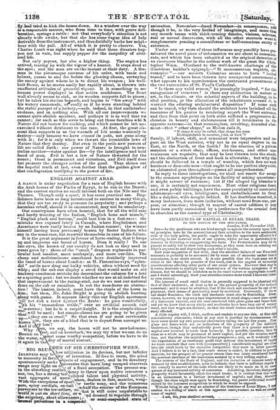INFLUENCES OF CAPITAL IN RETAIL TRADE.
TO THE EDITOR OF THE SPECTATOR.
London, 2eth November 1849. 16in—...4.s the gentlemen who are kind enough to agitate the country upon lite- principles rumples have for themomenrturned their attention ito-the more sentimenal evils of the body politic, the -public -ought to take the opportunity liffordeditol adverting to the material evils of our system, whilst no One is particularly is- terested in distorting or exaggerating the facts. The Protectionists may for the present be safely left to their own dissensions, as They seem bent on refuting each , other's arguments and depreciating each other's talents. Now your suggestion of last-week, that the admitted failure Of -oar Tree-trisle -measures is probably to be accounted for -by some sin of omission lather Maid commissiou,is no doubt correct. It is also possible that the-fault-may not* -Either in the theory for practice of free traele,lint in the neglect of .econothii* considerations affecting ether parts of our social system. However that mie.be, -'it-seems desirable to multiply our Observations of the various symptoms of tie disease, lest we should be -mistaken-as to its exact-nature or appropriate rens* -.and I would accordingly draw your attention tonome fitchrwhicb. Lhavenot hither. to seen noticed.
'The interest of small retail dealera is generally supposed to be identical-with that of their customers, at least as far as the general prosperity of the nation) -concerned: -and it must be admitted, that if the clerk-and inechauie'be out of ex-
filinealente'r - tilhoeuli smeans i e se a n a, the -clerk--mustantremstusriteted.o bfeiorfitzsseitg.if. the it- where however, .we may see a vest improvement in retail sho_ps,--..newswes opeod of a handsome exterior, and old ones renovated with plate-glass and brass-s04 and yet we know that many clerks and mechanics have been long out of emplsz ment, and that wages are reduced, so that -the retail dealers must have hems*. misty effected. A little inquiry -will, I think, confirm and explain to.any one this, at first sigh contradictory statement; which at -any rate is justified by circumstances Olt have come-under my own personaLobservation during the last Sve_years. Plait _glass and hrass-work are no indications of the prosperity of the indiridil tradesman, 'though they undoubtedly -prove that there is a greater Amount -capital now invested in trade than termeily. his possible, -therefore, that class-as a whole may be possessed if more capital, and Jet the -returns may less, and therefore -the-individual be-less prosperous; -and, as it -evidently is the -expectation of an exorbitant -profit that induces this investment of Ca we must conclude that men with (comparatively) considerable capital are ire into the retail-trade by the excessive competition they meet in other passel And Pbelieve it to he a fact, that mud!) money is risked, in addition-to -exertion, forthe prospect of ,no greater return than was lately considered fair thepereonal exertions of the tradesneamassisted by A very trilling-capital.
The returns of the Bank of England, and the reduction of interest lately flounced by that establishment, seem to.indicate that there is sufficient capital
. the conntry to answer all the calls which are likely to be made on it In quence of any increased activity of commerce. Admitting, therefore,that gen prosperity would:favourably affect the retail trader, it is evident.that this a be RS inducement to a further .investment of capital; and !het, .Theref though the class might once again be flourishing, the poorerandividual would ruined by the increased competition to which he would be exposed.
Without being in any way an admirer of the doctrines of Louis Blanc, I confess to a feeling of alarm at this apparent omnii msence as well use trace of capital. ism, Sir, your obedient servant,


























 Previous page
Previous page